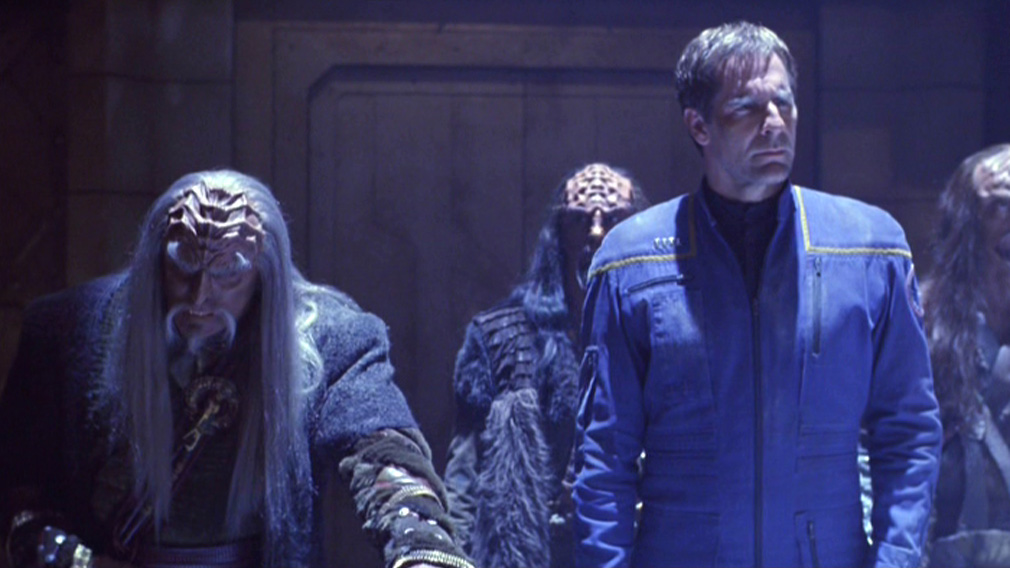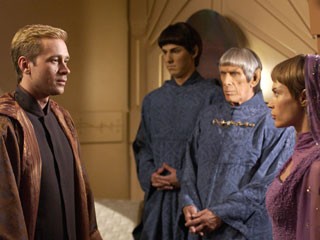I'm always among the select few among people who love what I love. It should be no big surprise that I love
Star Trek: Enterprise, unabashedly. Here are seven episodes of the series at its finest, and then seven more from the character who helped
make the series its finest:
1.
"Fortunate Son"
Travis Mayweather got a lot of flak for being the
least featured main cast member in modern franchise history, although he got two feature episodes during the four seasons of the series (far more than similar characters in the original series). I was fascinated with his backstory, coming from a family of Boomers, humans who lived on ships well before it became the norm in Starfleet. This first season episode is the first time we have a look at what that kind of life was like, and what it's like to see progress pass you by.
2.
"Cold Front"
The whole concept of the Temporal Cold War baffled fans who thought the series was only going to be a prequel, and then moreso when the conflict only came up occasionally. The only real disservice the arc ever got was when it was jettisoned at the start of the fourth season. Otherwise this episode from the first season will always be a highlight, the introduction of Daniels and the best spotlight for Suliban Cabal agent Silik, who tries to convince Captain Archer that they're not actually on opposing sides. The next most intriguing episode in the arc would be "Future Tense" from the second season. That one features Tholians, rebooted time, arms being cloaked. Good stuff.
3. "Detained"
 |
| via Star Trek |
Scott Bakula's
Quantum Leap co-star Dean Stockwell made a visit in this first season episode that took a different look at the Suliban, from a sympathetic standpoint. The historic reunion was itself worth the price of admission, but the story around it was more than sufficiently weighted to justify it, and completely threw off all expectations. A similar episode from the Xindi arc third season, "The Shipment," explores the matter of reconsidering assumptions.
4. "Judgment"
 |
| via Borg (how awesome is that?) |
One of two episodes extrapolated from
Star Trek VI: The Undiscovered Country (the other is
Voyager's "Flashback"), featuring a Klingon trial and sentence to Rura Penthe. Except this is no ode. This is one of Star Trek's periodic
Rashomon tales, featuring two very different versions of an encounter between our crew and a Klingon ship. The significant bonus is J.G. Hertzler (best known in the franchise as Martok in
Deep Space Nine) helping to broaden our sense of Klingon society, which after
DS9 and
Next Generation, you probably didn't even think was possible.
5. "Twilight"
Similarities to other reboot episodes are a moot point: this is the best episode of the Xindi arc, one of two standouts (the other is "Similitude") that dramatize the ramifications of the crew's desperate mission that have nothing to do with the mission itself, but rather its human toll. After an accident, Archer can no longer form new memories. T'Pol elects to stay by his side and refresh him on current events, a situation that endures for years.
6. "Stratagem"
Besides "Twilight" and "Similitude," this is the finest episode of the third season, and continues the surprisingly contemplative trend of all these episodes. And that's the thing about
Enterprise. It's not really merely a prequel or merely another series about space exploration. It took a great deal of time to just think about things. It's like the
Next Generation episode "The Drumhead" expanded as an entire series. This one's about the nature of enemies. Degra had already expressed misgivings about what his Xindi brethren expected him to do in creating a weapon capable of destroying Earth, yet he's no closer to switching sides than any other of his kind when confronted directly by Archer.
7. "Home"
One of the earliest fourth season episodes looked back at what the series had done rather than attempt to revise its whole approach, as with the rest of the final season. This one deals with the emotional fallout from the Xindi arc, both its toll on Archer and where it left the relationship between Trip and T'Pol (despite what the above image seems to suggest, it's not marriage). Similar to "Family" from
Next Generation, which found Picard healing from his Borg experience, "Home" is an episode fans of the series can't help but love, and as such may be ideal to help the uninitiated discover a little love for themselves.
The bonus round is for me a no-brainer. The best character of the series wasn't Captain Archer, but his faithful engineer, Charles "Trip" Tucker III. He might have seemed like a McCoy knockoff at first, the good 'ol country boy, but the wealth of narrative material, and potential, he provided was invaluable, essential, and exactly the subject that infamous series finale really featured.
- "Shuttlepod One" (first season) Trip and stuffy Malcolm Reed don't kill each other, but rather end up bonding. The start of one of Trip's many defining relationships.
- "Desert Crossing" (first season) The best example of Trip and Archer's relationship, which features the always-excellent Clancy Brown, and Trip saying this (while suffering from heat exhaustion and trying to humor Archer's request that he take his mind off the heat by talking through the major components of the warp reactor): "Well, there's the drumsticks, thighs, wings. You got anything to eat around here?"
- "First Flight" (second season) In which we experience how Archer and Trip meet, which takes the form of a story Archer tells T'Pol, a reciprocation of "Carbon Creek" from earlier in the season.
- "The Expanse" (second season) Besides a flood of Trip episodes that season, it became all the more obvious how valuable he was to the series when the Xindi arc was kicked off as affecting Trip most directly with the loss of his sister during the original attack.
- "Similitude" (third season) Trip is mortally wounded, Phlox proposes a solution that leads to medical and ethical dilemmas, and Archer must decide how these matters conclude. The character study of all character studies in this series, with the character of all characters in this series.
- "Demons"/"Terra Prime" (fourth season) Often considered the "real" series finale (and featuring Peter Weller in the franchise years before Star Trek Into Darkness), this is the culmination of the Trip/T'Pol relationship. I dare you to not become emotional at its conclusion.
- "These Are the Voyages..." (fourth season) Often listed as one of the worst episodes of the series, mostly because Next Generation characters "hijacked" the final episode, this is actually a Trip story, stripping away all distractions. And what better way to end the series than with one last rumination on its best character? I don't even mind that it features his death. Why would I? Does death diminish a life? In a way, it was completely appropriate. This was the end of the franchise in some ways, certainly that era. There was a prominent tie-in with another series. There was Archer finally intoning (part of) the famous motto. And there was every character talking about Trip. I couldn't possibly have asked for something better. I think once fans have a more favorable impression of the series, they'll come around and agree with me.








6 comments:
I doubt you and my sisters would agree with what are the best episodes, though you could all debate at length. I have never watched it all the way through. The irony of course is that Enterprise is the only series that remains canon in the rebooted movie universe.
They all are. The rebooted movie universe is an acknowledged parallel reality. Old Spock comes from a time after Star Trek Nemesis.
But what Pat said, and is what is correct, is that since the alternate movie universe reimagines TOS, only ST: Enterprise remains unchanged...as evidenced by the NX-01 model in the admiral's office in the second reboot movie.
All 5 series remain in the "prime" timeline, but only ST:E exists within the context of both movie series timelines. :)
Well, it's exactly the same as, say, the Mirror Universe. They exist simultaneously.
A woman I knew in college, Emily Bergl, guest-starred in one episode. She was Bethany in "North Star."
That's awesome.
Post a Comment